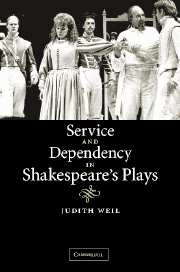1 - Introduction: “Slippery people”
Published online by Cambridge University Press: 22 September 2009
Summary
Early modern service seems to have been defined through association with various forms of dependency. Loosely congruent types of subordination and support colored and shaped this social practice. My initial concern with service was more dramatic than social; it grew from a sense that here was a way of explaining why Shakespeare's characters are so often more like potencies than identities. I have never understood these characters as essences or even as rhetorical constructs. They excite me as moving intersections of relationships. Through a process delightful to watch but difficult to describe, Shakespeare can suggest that ‘character’ is something volatile and often shared because dramatic people seem to construct each other. Instead of assuming that service was necessarily archaic and repressive, a common reaction by enlightened thinkers and politicians for two hundred years, I began to see this mobile and adaptive institution as a way of accounting for distinctive features of Shakespeare's craft.
The study that has evolved from these surmises attempts to balance between an engagement with dramatic and with social questions. Because the practice of service may be unfamiliar to many contemporary readers, its customs must be presented in some detail. Whenever possible, I combine social description with dramatic inquiry; I approach Shakespeare's plays as evidence of how he tested and explored cultural attitudes toward service and dependency. These attitudes, reflecting the pervasiveness of early modern service, are highly variable. They correspond to and were probably modified by plays which feature significant conflicts of obligation involving service.
Information
- Type
- Chapter
- Information
- Service and Dependency in Shakespeare's Plays , pp. 1 - 17Publisher: Cambridge University PressPrint publication year: 2005
